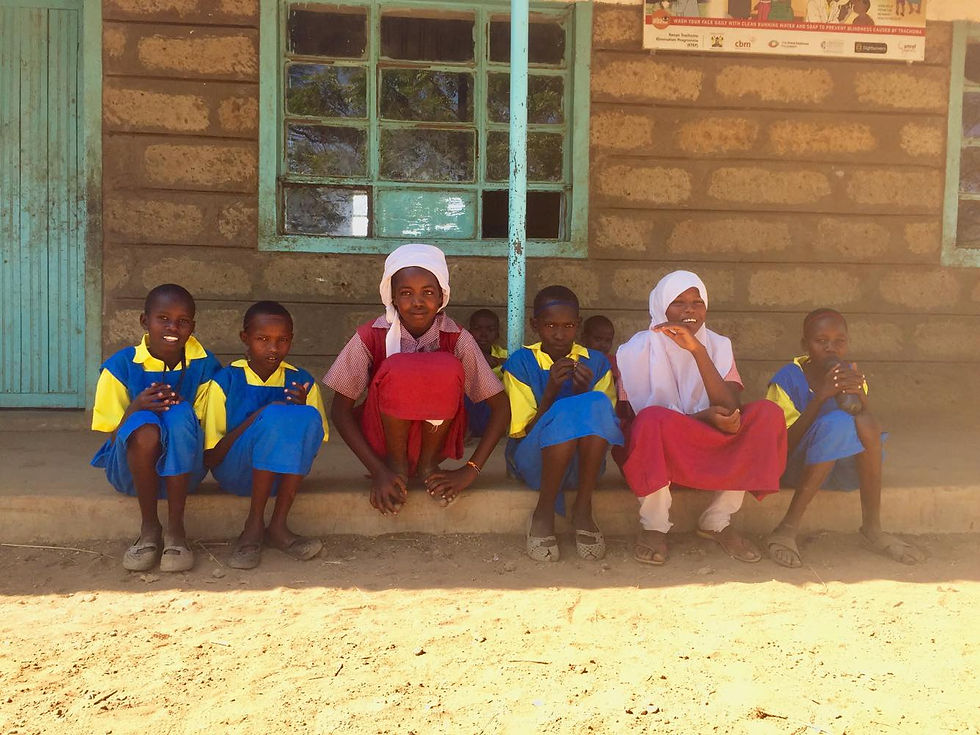A Seed for Prosperity and Family
- Griffin Oluoch
- Jul 29, 2019
- 4 min read
Over three years ago, Children Peace Initiative Kenya (CPI) came to Baragoi to begin a peace program. The conflict between people of the Samburu and Turkana ethnicities was very much still active (as it is now), and the need for an innovative peace program was apparent. While the program began with great promise, a funding gap prevented the program from being continued to fruition.
Now, CPI has returned. The division between the Turkana and Samburu is currently defined as a corridor of conflict with its unofficial line of demarcation being the principal road running North-South through Baragoi. To the East of the road are the Samburu people and to the West are the Turkana people. The owners of residences and businesses are relegated to abide by this norm.
On Wednesday the 3rd of July (2019), approximately 5 days into our mobilization effort, I met with a beneficiary of this previous program. Despite its brevity, this program had an immense impact on the lives of two families of beneficiaries. The beneficiaries were the families of James Esokon (of Turkana ethnic identity) and Chief Leparoiya (of Samburu ethnic identity), whose respective sons, Collins and Charles, participated in the 2016 program.

Hilary Bukuno (on the left) and James Esokon sit on the front steps of the Morning Star Hotel to discuss how friendship has brought prosperity
James Esokon happily met with Hilary Bukuno (CEO of CPI Kenya) and I on that stifling hot afternoon. We sat together on the front steps of the Morning Star Hotel in Baragoi facing the same street that divided the town. After getting to know one another, we began to listen of Mr. Esokon’s account of his life before and after the Peace Camp program.
Prior to the 2016 attempt to begin a Peace Program, Mr. Esokon attested that he could not venture into Samburu territory, especially where his new friend lives. He claimed that “without knowing anyone, I could have been killed!” This sentiment was complemented by the fact that before meeting the Chief and his son, he didn’t have relations with any Samburu and generally feared the people of Ngilai.
However, now, the resident of Nalin’gan’gor village frequently makes the long trek to Ngilai to visit his friend, even being welcomed and recognized by residents of Ngilai as a companion of the chief. More importantly, the meeting of their sons in 2016 united the two families. They met shortly after the exchange program that brought Chief Leparoiya to his small village. Following heartful conversations, they quickly became friends.
Over the years their friendship has grown even stronger. From their children spending holidays together to helping each other conduct trade across community boundaries, their friendship has brought mutual prosperity, security, and a new definition of family.
The redefining of “family” that I am alluding to pertains to the sharing of important milestones and ceremonies that were once limited to community members and immediate family. For instance, the practice of circumcision during adolescence is an important rite within both Turkana and Samburu communities separately. When Mr. Esokon’s son’s, Collins, ceremony occurred, Chief Leparoiya attended and gifted the family with a goat. Now, James Esokon has the opportunity to help Chief Leparoiya prepare for his son’s circumcision ceremony. The Chief has asked him to find a goat hide for his son to wear during the multi-day ritual marking the transition to adulthood.
The sharing of such important rites complements additional signs of respect and appreciation. Mr. Esokon recounts that the Chief has gifted him three goats in total and frequently visits his son, who is now schooling in Maralal (the capital of Samburu County). Such a close relationship has also facilitated the trade of livestock between Samburu and Turkana communities. Due to the Chief’s political weight within the community of Ngilai, Mr. Esokon can freely bring his animals to Samburu markets. And, when tensions are high between the communities, Mr. Esokon escorts the Chief’s livestock for sale within Turkana territory.

Karito Leparoiya, the son of Chief Leparoiya and Peace Camp beneficiary
I found myself moved by the stories Mr. Esokon revealed to me. So, throughout the rest of my time in Baragoi I sought to speak to Chief Leparoiya. Unfortunately, our schedules never properly lined up for a meeting to take place. Nonetheless, I was able to meet with Chief Leparoiya’s youngest son, Karito Leparoiya. Karito was part of the Peace Camp in Bendera (a small village outside of Baragoi) and agreed to speak with me on the last day of the inter-communal events.
The 14-year old student of class 6 gave off an aura of confidence that seemed to mask his small stature. He quickly substantiated all the stories provided by Mr. Esokon. Furthermore, Karito added that Mr. Esokon is “like an uncle” to him and frequently brings fresh milk to his family’s house. Now, having witnessed what the Peace Program can do for his family, Karito wants to be an ambassador for peace to educate the rest of his community.
As Karito attests, and I have observed, the advantages to individuals and families of the Peace Program are immense. In just a short period of time, and without the entire program being completed in Baragoi, two families have realized how friendship and prosperity are interlinked. Now, the goal is to carry the program to its completion. With years of involvement ahead, CPI and Zivik anticipate creating hundreds of friendships that can lift communities out of abject poverty.
If you wish to help Children Peace Initiative Kenya’s ongoing project in Baragoi, please visit the GlobalGiving page or contact CPI Kenya directly.

Hilary asks Peace Camp attendees, “who will bring their new friend to their village and introduce him/her to their family”. Almost everyone raises their hand.




Comments